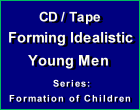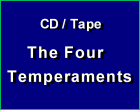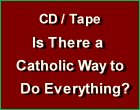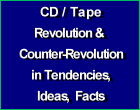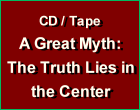Ecology
 |
 |
 |
 |
 |
 |
 |
Veganism & the Destruction of
God’s Created Order
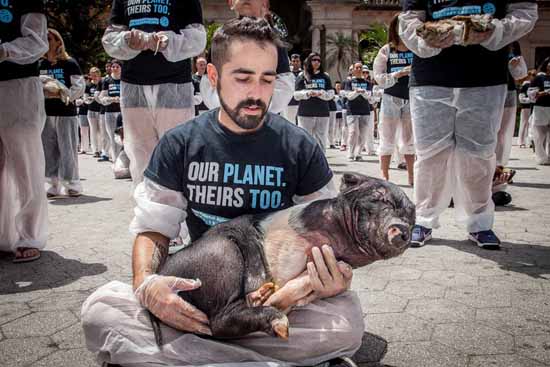
The vegan movement is a revolution
So says Gary Francione, American lawyer and philosopher, who developed an animal rights theory, a novelty that he taught, and still teaches, in an American Law School. Francione argues that animals should not be used or treated like property. (1)
Rather, he believes that animals are ends in themselves, a theory that indeed creates a “profound revolution” within the human soul that is neither logical nor Catholic.
It may come as a surprise that this revolutionary way of thought has been adopted even by traditional Catholics. This fact has come to our attention through a reader who requested an article to be written on the evils of Veganism so that she can convince her Catholic friend not to be “vegan.” (2) Before explaining the wrongs of Veganism, it is important to understand what is meant by the term.
Errors of Veganism
The term “vegan” is a modern word that first came into existence in 1944. (3) Veganism is a form of vegetarianism in which all animal products – including meat, fish, eggs, milk, honey, wool and leather – are excluded from the diet and life of the vegan. But it is not simply a rejection of using these things: It is founded on the theory of animal equality.
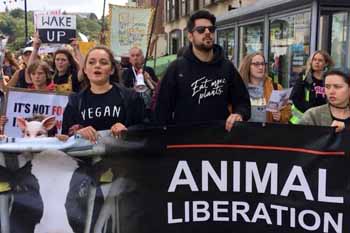
Demonstrating for the 'rights' of animals
To say that animals have rights is to say that animals are equal to humans, which the vegans in fact believe, though it is contrary to Catholic teaching and Natural Law. God created man and woman in His image, setting them above all of creation and giving them the right to make use of the lower creatures. This inequality of Creation is evident even among animals, where a hierarchy prevails among different animal kingdoms, classes and species.
The second fallacy of the vegans is the belief that to kill an animal is to commit murder. If this belief were so, then a person would be considered a murderer whenever he ran over a squirrel that ran across the road. It is clear that such a radical claim has no foundation in reality.
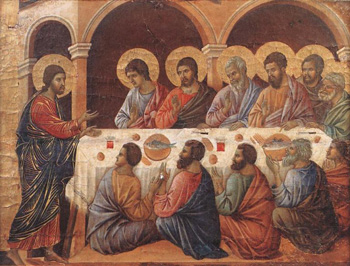
Our Lord ate the pascal lamb at the Last Supper
When a need arises that requires an animal to be killed for the benefit of a human, it is not only permissible but also in certain instances imperative to do so. In the Old Testament, God commanded the Jews to offer sacrifices of lambs and other animals for His honor. Our Lord Jesus Christ himself ate the flesh of animals – and even cut the throat of the paschal lamb, according to Ann Catherine Emmerick – and fish, although He easily could have refrained from doing so. To be vegan, therefore, would be to accuse God of committing a sin.
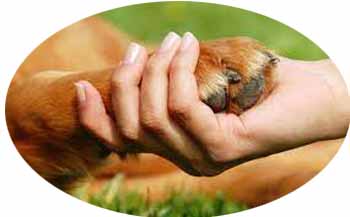
To affirm that man is equal to animals is a revolt against the order God placed in the world
The vegans, however, believe that it is wrong for any living being to have to suffer in this world, a philosophy based on the Eastern religious cults, as for example Buddha, who says, "May all that have life be delivered from suffering."
To eliminate all suffering is one of the goals of the One World Order being promoted by Lucifer, who hopes to create a false utopia on this Earth in order to deprive souls of the glory that awaits them in Heaven. For, the suffering reminds us of our original sin and the necessity of Our Lord's Redemption to attain our eternal salvation. A Satanic attempt to accomplish this false utopia is to do away with the order established by God and struggle to create an egalitarian society where there is no distinction between young and old, women and men, poor and rich, animals and humans, plants and animals.
Modern meat industries
It is perhaps understandable why even some traditional Catholics have fallen into the trap of Veganism as a reaction against the modern meat industry. Today most animals raised for meat (or other purposes, such as dairy and eggs) are packed into filthy barns, fed only GMO grain, pumped with hormones, and isolated from the green pastures of their natural habitat.
Everything about this industry is unnatural and geared towards the modern consumer mentality: of providing great quantities of food fast and cheap.
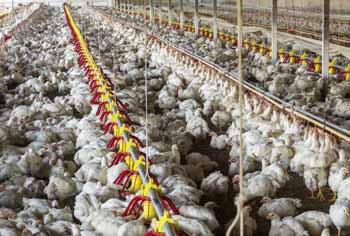
The industrial poultry farm vs. animals serving man in a natural environment
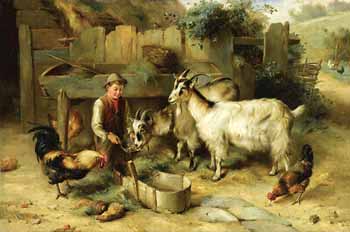
Notwithstanding today's abuses, the state of the industrial farms is not an excuse to become vegan, because, as demonstrated above, the beliefs of Veganism are incompatible with Catholicism. If a Catholic is concerned about the wholesomeness of his meat, he can either eat less meat in general or buy pasture-raised meat from organic farms. In this way, he would be supporting the suffering small farms that are the last stand of resistance to industrialized society.
On the other hand, in many monasteries and convents, meat was seldom eaten. In this case, the monks and nuns were not against the consumption of meat. Giving up meat was symbolic of giving up carnal pleasures and was done as a sacrifice, as is all fasting that is truly pleasing to God. A Catholic can imitate this good example as a means of abstinence and penance, but he should not entirely reject eating meat or condemn those who do.
Animals were created for man
To be Catholic is to accept God’s order of Creation. Animals must be in their proper place and used according to the design of God. How men are meant to use animals is described in detail in the The Catechism Explained, first published in 1899:
“The lower animals are created by God for the service of man.
“The benefits we derive from the animals are these : They supply us with what is essential to life, e.g., food, clothing, etc.; they help us in our work, they cheer us by their amusing ways, their song, their beauty, etc. Some instruct us by their example; bees, for instance, incite us to industry, storks to filial affection, sheep to the practice of patience, etc. Moreover they all proclaim the omnipotence, the wisdom, the bounty of their Creator.
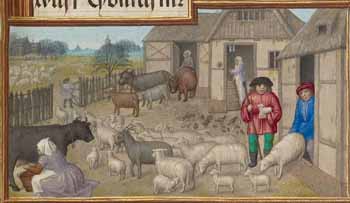
The medieval man had a balanced view of animals and nature
“We ought to take care for the well-being of animals. The just regardeth the lives of his beasts, but the bowels of the wicked are cruel (Prov 12:10). Those who keep animals are bound to provide them with necessary food, to keep them clean and in good condition ...
“Some treat brute beasts as if they had no feeling, overtaxing their powers, beating them unmercifully, not giving them enough to eat, or depriving them of the one day of rest out of the week which the law of God ordains for them (Ex 20: 8-11). Those who have to kill animals for the table, and medical men who make experiments with them, ought to be careful to cause them no needless suffering. It is not right, either in the interests of science or for the sake of amusement, to give pain that can be avoided.
“Wanton cruelty is to be condemned; so is the destruction of harmless or useful animals. Noxious insects and dangerous animals must of course be killed, but others that are not hurtful, but rather useful, should be spared. Finally, animals are not to be pampered and petted over much. There are people who make an idol of some pet animal, preferring it to their fellow-man, and devoting every thought to it. Such persons resemble the ancient Egyptians, who worshiped cats, calves, bulls, etc.
“Men who are either cruel to animals or ridiculously fond of them, often are very hard-hearted towards their fellow-men. ...
“Both extremes, cruelty to animals and foolish fondness for them, are at variance with the order that God has established in the universe.”
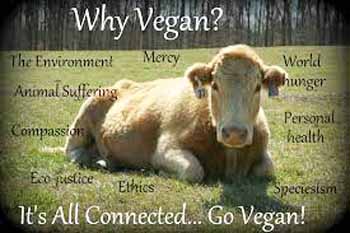
An all-encompassing revolution
- https://en.wikipedia.org/wiki/Gary_L._Francione
- https://www.merriam-webster.com/dictionary/vegan
- Ibid.
- Spirago, Francis and Richard F. Clark, The Catechism Explained : An Exhaustive Exposition of the Christian Religion, with Special Reference to the Present State of Society and the Spirit of the Age. 1899. Rockford: TAN Books and Publishers, Inc. 1993, pp 390-391.

Posted March 14, 2022
______________________
______________________






